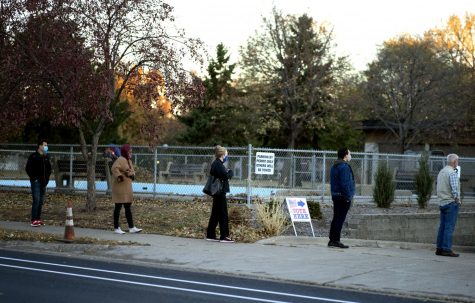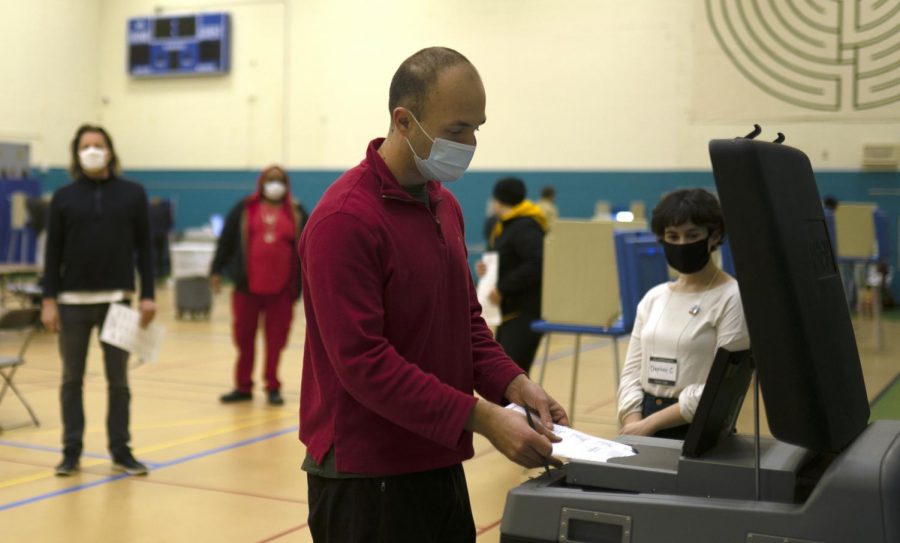Before the sun had fully risen, voters lined up at polling centers in neighborhoods around the University of Minnesota to cast their ballots for the presidential election.
Voting this year has proven to look like no other, as many people opted to mail in their ballot to avoid gathering in person during the pandemic. Still, centers in Marcy-Holmes and Cedar-Riverside saw a steady trickle of early morning voting.
Brian Coyle Center
Adam Hajimumin, 36, was one of the first people in line at the Brian Coyle Center. Though he didn’t doubt the security of mailing in his ballot, coming to the center was more about convenience.
“I know what’s at stake today, that’s why I’m here,” Hajimumin said. For the father of three children, the pandemic loomed large in his mind.
“I want a real plan for this to be stopped. I want our small business[es] to come back, to be reopened, our country too, but in a safe way,” he said. Hajimumin said he has been looking for work, and previously picked up driving for Uber.
Zak Hassan, 39, came early to vote because he thought there would be long lines. His main concern was the pandemic’s impact on the economy, and he planned to vote for former vice president Joe Biden.
“He can get control of the virus, unlike Trump people. They just give up, saying ‘we can’t control this thing,’” Hassan said.
While voters moved in and out of the community center, Mike Christenson spotted two people without masks and walked over to give them a pair. For multiple elections, Christenson said he has showed up as a poll watcher to make sure people “feel supported and safe.”
“We’re bringing masks, water, snacks if they need it. I’m always here at Cedar-Riverside,” Christenson, who works at the neighborhood’s opportunity center.
Concerns about potential voter intimidation have shadowed Minnesota’s presidential election, after President Donald Trump and other groups encouraged citizens to watch their local polls for election fraud.
In response to the heightened tensions, three volunteers with the Nonviolent Peaceforce were at the polling center to keep watch for voter intimidation and to help with de-escalation should conflict arise.
The St. Paul-based, nonpartisan organization usually works in conflict zones outside the U.S., but has been increasing de-escalation training since the police killing of George Floyd, said Claire Guinta, the external relations manager. Guinta said the organization has 250 volunteers in bright orange vests out at the polls today.
“The goal is there is no violence, so we want to have a boring day,” Gunta said.
A private security worker stood at the entrance of the Brian Coyle Center, but declined to comment except to say they were hired by the state for security, and that their company usually works at Vikings football games.
The U.S. The Department of Justice announced earlier this week that federal officials would be sent to monitor for election law violations in Minneapolis, the Star Tribune reported.

Marcy Open Elementary School
The elementary school saw about 30 people waiting in line during the morning. Fourth-year University student, Elizabeth Schmitgen, was among them.
Schmitgen, 21, said she’s “not interested” in another Trump presidency. As an aspiring clinical child psychologist, Schmitgen wanted to see universal preschool, as well as social welfare and healthcare reform.
As for why she decided to vote in person: “I’m not looking for any excuses for why my vote could not count.” Schmitgen was concerned that if Biden wins, some Republicans would argue that mailed-in votes are illegitimate.
Joseph Miller, 31, a bank worker, cited similar worries when he showed up to vote. As a Biden voter, Miller was concerned that since more Trump voters were likely to show up on Election Day, the president would try to announce his win based on in-person voting alone.
“If we don’t elect Joe Biden today, that’s like bringing us more steps toward authoritarianism than we currently have been in the past,” Miller said.
While Miller called Trump “pretty awful by politician standards,” Biden, in contrast, is a candidate that fits the typical liberal mold.
“He’s like a generic candidate, he’s not really breaking any barriers in terms of policy, but that’s fine,” he said.
Joan Eldeard, 46, said she’s personally felt the impact of COVID-19 closures. As a person with autism, she regularly attended a day program that has been closed during the pandemic and may not reopen. “That’s basically my offline community – just gone,” she said.
To Eldeard, these consequences of the pandemic were preventable, had the Trump administration been prepared.
“Every 100 years there’s some kind of major pandemic, so it’s not like nobody knew this was going to happen,” Eldeard said.
The University-area has historically been a Democratic stronghold. In the state Democratic primary election, voters at the Marcy Open School and Brian Coyle Center polls overwhelmingly voted for Vermont Sen. Bernie Sanders while Biden won the state. Since the senator dropped out of the presidential race, students have begrudgingly expressed they would turn to Biden instead, or even seek alternatives in third-party candidates.
Lydia Morrell and Katelyn Vue contributed to this report.



















